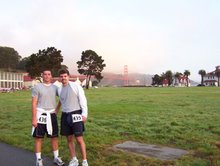
I was driving early this morning, and caught one of my favorite radio shows- Coast to Coast with George Noory. I use "favorite radio show" very loosely. It's can be really entertaining, and you feel like you have been transported to an entirely different culture when you listen to the callers. You can learn a little about the content here: Coast to Coast.
Anyway, the topics vary from UFO's to ghosts to conspiracy theories. You can imagine this brings in some very "interesting" callers. Today they were talking about Neurotheology, and had an author that wrote one of the main Neurotheology books out there. I have never heard much about this before, and maybe Eric could shed some light on the subject if he has delved into this at all. It, in my understanding, is an attempt to connect a materialistic approach like neuroscience to spirituality. Wikipedia has a nice summary of Neurotheology. You'll have to let me know what you think. It is at least an interesting concept.



6 comments:
Coast to Coast is an interesting show. Some of the callers are either absolute nutjobs or have really have had terrible alien probing experiences. Who am I to say that can't be true?
One lady called in and said 1 year after her friend died she got proof of an afterlife on her birthday when he sent her a sign. She was walking down the street, thinking of her friend and in a moment of self-pity said, "Bob, you didn't get me anything for my birthday", then on the next block she said she found 150$ of mary-jane in a plastic sack on the sidewalk. I can totally see how that is definitive proof of an afterlife.
I'm sorry, but I don't shed light on things. I am a biological organism that casts a shadow when light is shed on me.
Aside: I like how the last paragraph of the article is completely out of context...
I do have some experience with the project, but not specifically with the term. The term, by the article, is misleading. It purports to be the identification of "spirituality" with its neurological bases. But it should instead be about "God" if it is going to be a theology. I like Daniel Dennett's approach to that: our idea of "God" derives from the drive to answer "Who did that?" Or "Who's there?" Knowing who to "blame" seems to be an effective survival strategy... I doubt it, though.
At any rate, it is hard to tell from the article whether the goal is to reduce spirituality to the physical bases, or to identify the physical bases though spirituality ends up taking on a "life of its own" - like liquidity being more than just H2O. Both projects are pretty interesting.
There is a "tradition" of these projects stemming all the way back in the West to Epicurus and Democritus, and in the South Asia to the Caravakas and Gautama Buddha. (Interestingly, they were basically contemporaries, around 500 B.C.E.) What I like about this conversation is that the form remains the same, though some of the specific details change.
I'm on the fence about spirituality and materialism - I mean, we do really mean things when we talk about "team spirit" and "the spirit of an age." It has more to do with movement (how) than substance (what).
But I am leaning more towards "materialism" when it comes to the supposed existence of subjectivity and freewill. Those are, like Nietzsche claimed, products of our biological drive to vent. We need so-and-so to be responsible, that way we can get the pleasure of punishing them. But logically, punishment is incoherent: it can't make up for whatever happened. It's about our self-satisfaction in being able to punish (or, make someone else suffer)... But I'll get off my soap-box now.
I can't decide how I feel about the topic. I think that it is interesting, but to be honest it makes me feel uncomfortable. I am not sure why it does, maybe because it could question God. I have heard the theory that when we die, and people have near death experiences, it could just be random neuron firings, not some spiritual or religious experience. The brain is pretty complex for random neuron firings to produce anything other than a brief aura or full blown seizure, not full on auditory or visual hallucinations.
The whole neurotheology topic suggests a hint of searching for a materialistic basis for religion and or spirituality, (yes, I understand those can be 2 very different things). I am a man of science, but I think the only way I can approach my religion is faith. I hope this was more than just incoherent ramblings to you nedric, and thank you for your thoughts as well....
It's interesting you chose to put it as, "the only way I can approach my religion is faith." It seems for people like yourself, they require personal experience (or faith) in order to be religious. But I also think it is possible for people to be religious by just practicing it (without worrying about if they "believe" X or Y). And, in the end, I think that being religious is a bit different than studying (that is, doing the "science" of) religious practices and institutions.
I am also curious (if you are comfortable sharing): Why are you uncomfortable with the idea of questioning God (in the sense of questioning the existence of God, right?)?
St. Aquinas, for instance, conceives of "God" as, on one level, the unifying principle of the whole. To question that would be like saying that nothing makes sense. I can see why that might make someone uncomfortable. I personally often experience everything as not making any sense - especially my friends ;)
nedric- sorry about the delay. i have been neglecting the blog in this very busy week. I think we should have lunch mon or tues and continue this discussion over some nice Airliner Pizza, how's that sound?
Post a Comment